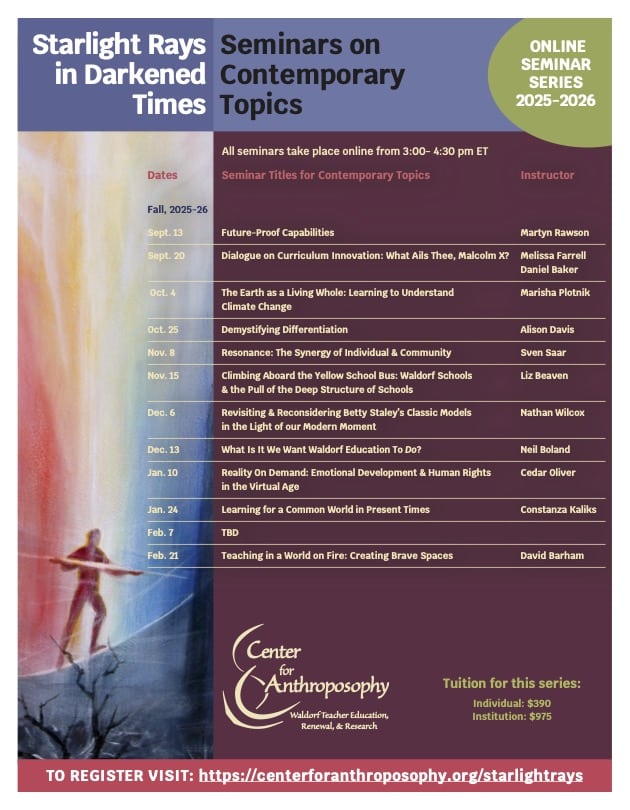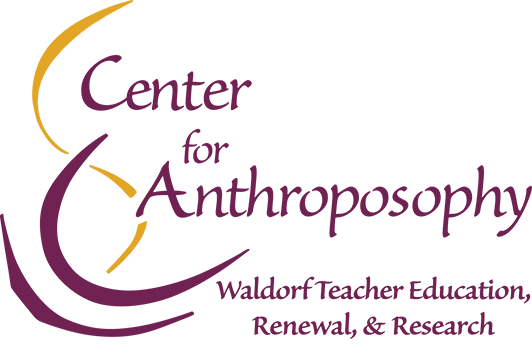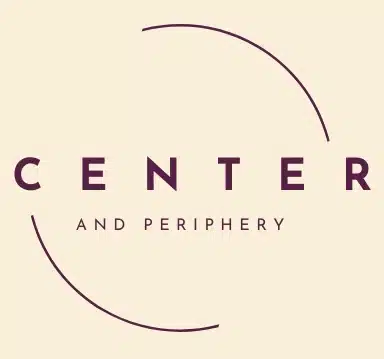In This Edition...
Starlight Rays in Darkened Times: Seminars on Contemporary Topics
Cedar Oliver teaches the Living Thinking course and leads the Chemistry & Physics subject seminar in our Waldorf High School Teacher Education Program (WHiSTEP). He was a recent presenter in our online seminar series, Starlight Rays in Darkened Times. During his presentation on Generative Artificial Intelligence, entitled, Intelligence, Artifice, and Education, he summarized the contributions of each of the previous presenters. Struck by both the graciousness of his approach and the beautiful way he encapsulated each of the previous speakers, I wanted to share Cedar’s words with the C&P readers.
Through Cedar’s captivating summaries, one can get a picture of the richness that participants are treated to during each of the twelve seminars in the series. Cedar was presenting on the very concept of intelligence, and he draws from each of the previous presenters to expand his own powerful insights.
PROLOGUE: Central idea to explore today: intelligence.
Two meanings: noun (valuable info.) and adjective (describing a person or artifact).
Focus on the word intelligence in the context of our Starlight Rays seminars so far:
Martyn Rawson, What Are The Developmental Tasks Facing Young People Today?
What I see is not all there is to see. Boundary ideas are beyond our ability to know.
Just as adolescence is a post-1900 concept, so is intelligence.
A tension: youthfulness is the most desirable phase,
yet mature intelligence is the most highly valued trait.
How does intelligence relate to:
competency, qualification for membership in community,
economic and political participation, health, stress, and identity?
Sven Saar, Diversity, Sexuality and Humanity
“I have, therefore I am,” is intelligence something I have?
How does the history and concept of intelligence relate to ableism, racism, misogyny?
Is intelligence a “disability that I don’t suffer from; The people I live and work with do.”
Marisha Plotnik, Why Teach Math in the Age of AI?
An algorithm is something that a chatbot can do.
How much of intelligence is algorithmic, vs. “perceiving beauty” and “actually thinking?”
“Not something someone else tells us, but something that we create out of ourselves.”
“Everybody can do something.” Can math class be genuinely “intelligence inclusive?”
Alison Davis, The Inner Work of the Teacher
Some words and concepts that may resonate today:
“I want to embrace you, not so much with information but with invitations.”
“I can’t do anything with or for you… if only your rational mind is in control.”
“You cannot get to the deepest part of yourself logically, or literally, or mechanically.”
“Warmth is what brings us to the world.”
“What we see matters less than how we see.”
from Iman: “What you have when you begin is already enough. The sense of something that is not there, either in yourself or in your students… is a kind of wreckage.”
from Catherine: How do you do it with high IQ students, others who are not that bright, and limited school resources? Alison: (a) Cry in the corner, (b) Do the work. These are our students, not obstacles to the curriculum.
Betty Staley, How the Teacher’s Biography Meets Adolescent Astrality
We don’t know where our words go. Our biographies are meeting other’s biographies.
“Give them space without judging them. They rise up.”
How can “gathering intelligence” build real relationships with Nature and other people?
Douglas Gerwin, To Sleep- Perchance to Dream: Waldorf Education in an Age of Insomnia
Day consciousness (waking) is equal in value to night consciousness (sleep), whenour self-aware sentience inverts its relationship to our living physical organism.
If you didn’t harvest true nourishment before sleep, you awake feeling cheated.
What kind of nourishment comes from Nature? From other humans? From artifacts?
Alison Henry and Chérie Rivers, Decolonial Dialogues on Waldorf Education
from Kofi Marfo & colleagues: Can intelligence be broad & holistic, not narrowly intellectual?
Is the world not simply mechanistic, but dynamic, imbued with deeper substance?
Can education be “in relationship,” not merely content to be delivered?
Must education alienate students from their environment and community?
from Cherie: The colonial logic meta-story of “civilization” keeps parts of the world invisible, leaves students feeling betrayed and imprisoned, pits “success” against justice.
Is our concept of intelligence working against our values?
I leave you with this poetic reimagining of some of our 2024-2025 series, and hope you will join us for Starlight Rays in Darkened Times: Seminars on Contemporary Topics 2025-2026, beginning in September.
The 2025-2026 lineup is truly magnificent and we want to share this with as many educators as we can all over the globe! We have lined up an impressive collection of internationally renowned speakers and thinkers with more to come including Martyn Rawson, Sven Saar, Marisha Plotnik, Alison Davis, Nathan Wilcox, Neil Boland, Cedar Oliver, Liz Beaven, Constanza Kaliks, Melissa McDonagh & Daniel Baker, Neil Boland, David Barham.
Come join this vibrant online learning community!
david@centerforanthroposophy.org
https://centerforanthroposophy.org/programs/waldorf-high-school-teacher-education/starlight/
https://courses.centerforanthroposophy.org/courses/starlight-rays-25-26

Spring/Summer 2022

